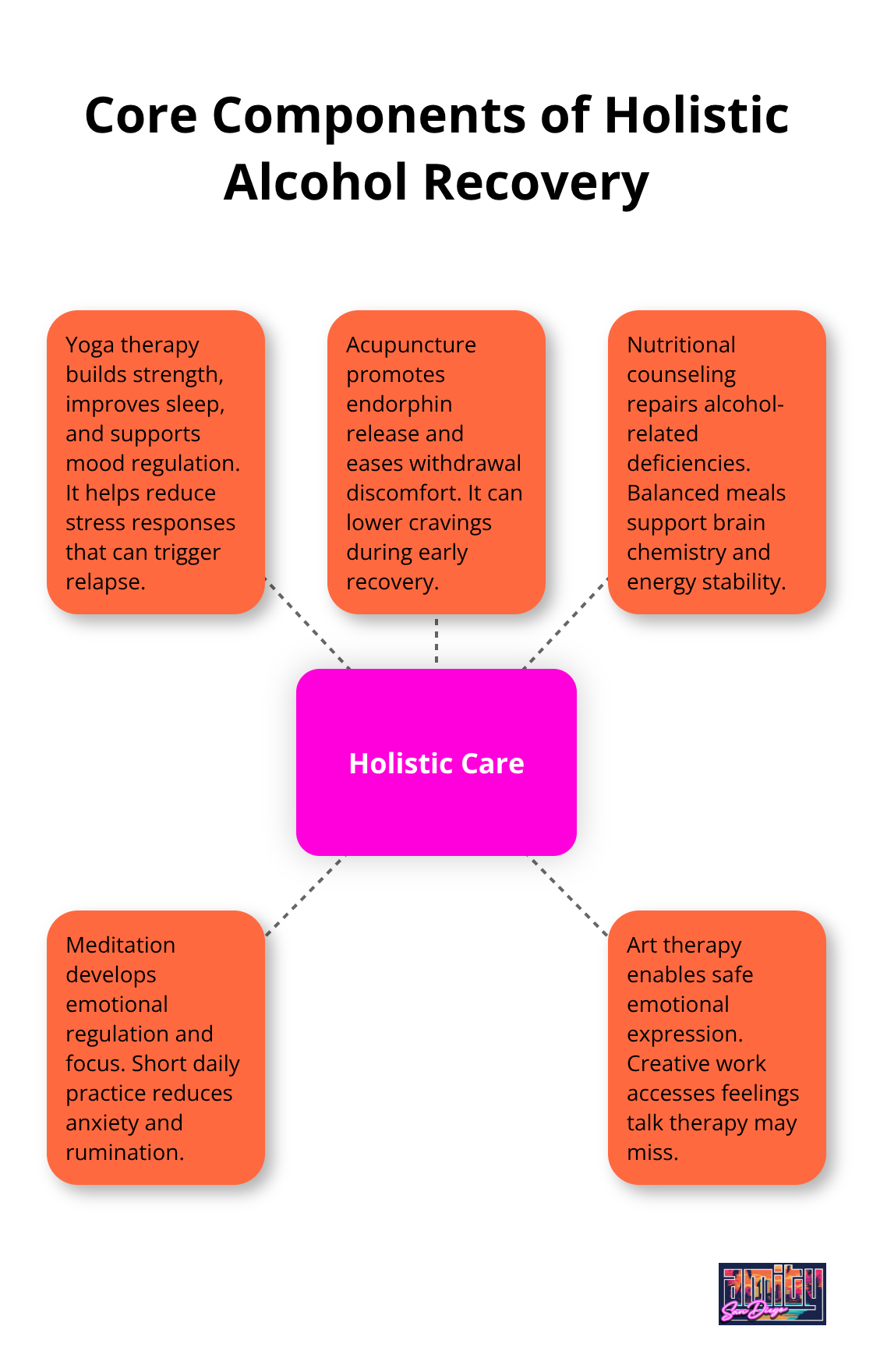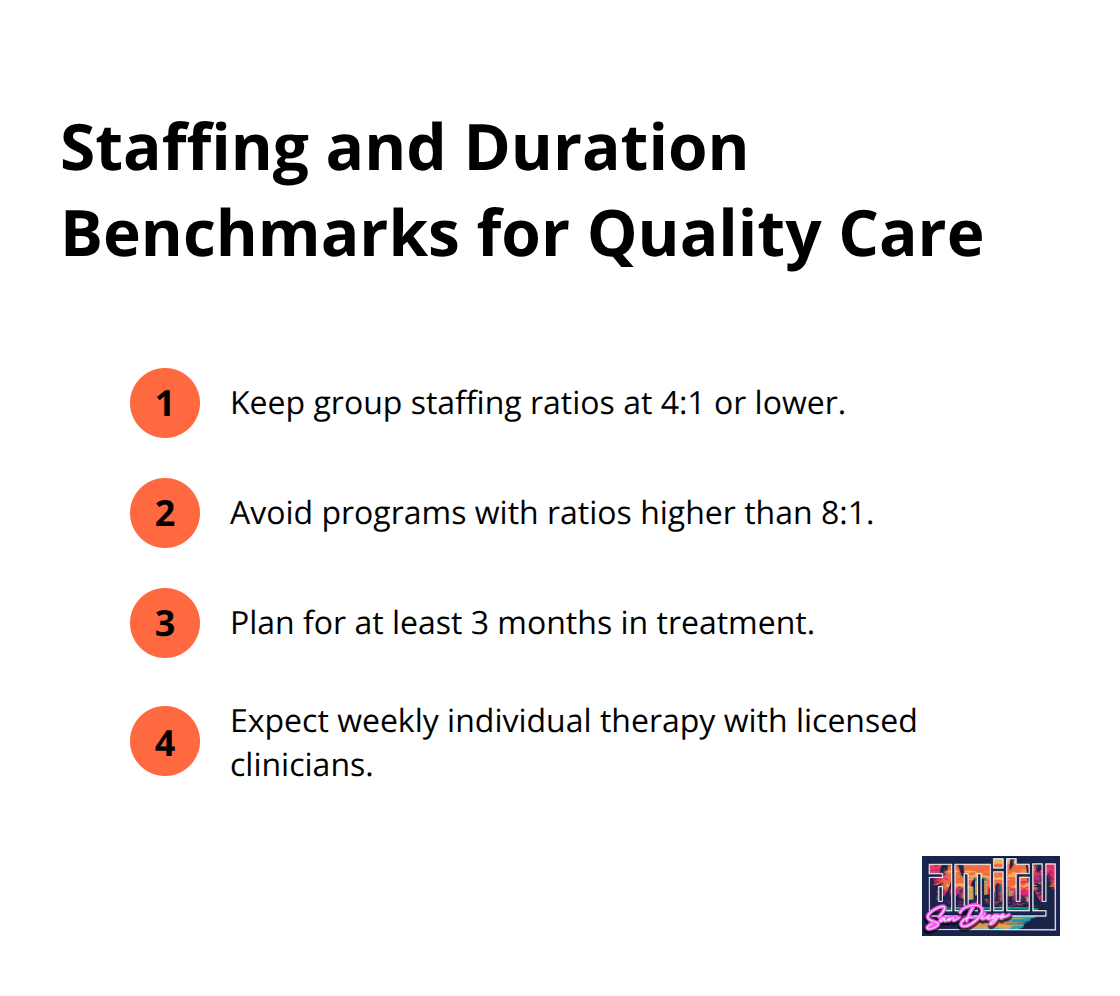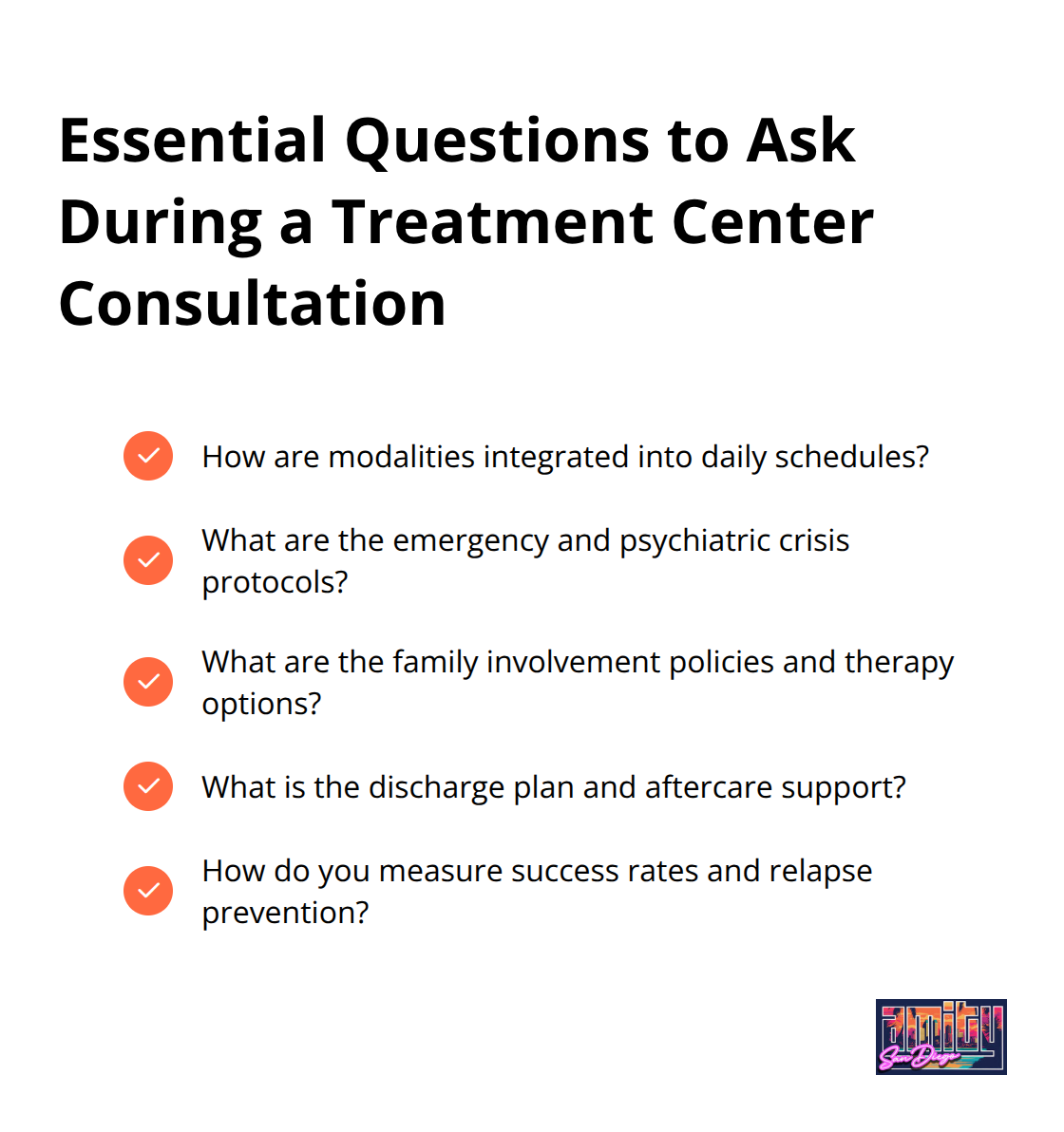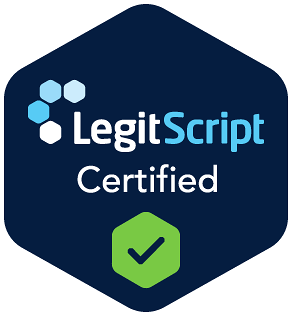Traditional addiction treatment often focuses solely on detox and counseling. This narrow approach misses the complex factors that fuel alcohol dependency.
Holistic alcohol addiction treatment addresses your physical, mental, and spiritual needs simultaneously. We at Amity San Diego believe this comprehensive method creates lasting recovery by treating the whole person, not just the addiction.
What Does Holistic Treatment Actually Include
Holistic alcohol addiction treatment combines evidence-based medical care with alternative therapies that address your emotional, physical, and spiritual well-being. The National Center for Complementary and Integrative Health has worked with the CDC to include questions on complementary health approaches in national surveys, reflecting the recognition that addiction affects every aspect of your life. Traditional programs typically focus on detox, counseling, and medication. Holistic centers add yoga therapy, acupuncture, nutritional counseling, meditation, and art therapy to create comprehensive recovery experiences.

Medical Foundation with Alternative Enhancements
Effective holistic programs start with medically supervised detox and psychiatric evaluation, then layer on alternative therapies. Research shows that yoga therapy has led to integration into psychiatry practice, with evidence supporting its benefits for mental health recovery. Acupuncture stimulates natural endorphin production, which reduces cravings and withdrawal discomfort. These therapies work alongside Cognitive Behavioral Therapy and Dialectical Behavioral Therapy to address addiction’s root causes. Quality programs integrate these approaches rather than treat them as separate services.
Evidence Behind Whole-Person Recovery
Studies demonstrate that substance use disorders show high rates of comorbidity with anxiety disorders, including generalized anxiety disorder, panic disorder, and post-traumatic stress disorder, making integrated treatment approaches necessary for recovery that lasts. Holistic therapy treats co-occurring disorders while it builds life skills that support long-term sobriety. Research indicates that patients in comprehensive programs report higher satisfaction rates and better treatment engagement compared to traditional approaches alone. The combination of medical intervention with mind-body therapies creates multiple pathways to recovery, which increases your chances of successful outcomes.
Components That Define Quality Programs
Comprehensive holistic centers offer specific therapeutic modalities that address different aspects of recovery. Yoga therapy promotes physical health, mental clarity, and better sleep patterns while it reduces PTSD symptoms. Acupuncture helps stabilize emotions and reduces anxiety symptoms, which contributes to a more balanced recovery process. Nutritional counseling addresses the physical damage that alcohol creates in your body and supports brain chemistry restoration. Art-based therapy and music therapy provide outlets for emotional expression that traditional talk therapy might not reach.
When you evaluate potential treatment centers, you’ll want to examine how they integrate these various components into a cohesive treatment plan. For comprehensive addiction treatment San Diego options, consider programs that combine these holistic approaches with evidence-based medical care.
Key Features to Look for in Holistic Treatment Centers
Quality holistic treatment centers maintain specific staff-to-client ratios that directly impact your recovery success. Programs with ratios higher than 8:1 cannot provide the individualized attention that complex addiction cases require.

Research indicates that most addicted individuals need at least 3 months in treatment to significantly reduce or stop their drug use and that the best outcomes occur when treatment addresses multiple aspects of a person’s life, which demands intensive staff involvement. Look for centers that maintain ratios of 4:1 or lower during group sessions and guarantee weekly individual therapy sessions with licensed clinicians. Centers that cannot specify their ratios or seem evasive about staffing levels typically operate understaffed programs that compromise treatment quality.
Medical Integration That Works
Effective holistic centers employ board-certified physicians alongside licensed therapists, registered nurses, and specialized wellness practitioners who work as a unified team. The facility must offer psychiatric evaluations within 48 hours of admission and provide medication-assisted treatment options without stigma when clinically appropriate. Centers that separate their medical and therapeutic staff into different departments create communication gaps that undermine treatment effectiveness. Your treatment team should meet weekly to discuss your progress and adjust interventions accordingly. Verify that the center employs full-time medical staff rather than contracted physicians who visit occasionally, as consistent medical oversight prevents dangerous complications during early recovery phases.
Alternative Therapies With Clinical Purpose
Strong programs offer yoga therapy, acupuncture, nutritional counseling, art therapy, and meditation as integrated treatment components rather than recreational activities. Each alternative therapy should connect directly to your treatment goals with measurable outcomes that clinical staff track. Programs that add holistic therapies without clinical supervision or progress measurement treat these modalities as amenities rather than therapeutic interventions. Quality centers provide detailed explanations of how each therapy supports your specific recovery needs and regularly assess their effectiveness in your treatment plan.
Personalized Treatment Plans That Adapt
Effective centers create individualized treatment plans within 72 hours of admission and modify these plans weekly based on your progress. Your treatment plan should address your specific substance use history, mental health conditions, trauma background, and personal recovery goals (not generic templates that centers apply to every client). Programs that use identical treatment schedules for all clients ignore the complex factors that contribute to addiction. Quality centers conduct regular assessments to identify what works for your unique situation and adjust therapies accordingly.
Environment and Facility Standards
The physical environment plays a significant role in recovery success, with research showing that calming, well-maintained facilities reduce stress and promote healing. Look for centers that maintain clean, comfortable spaces with dedicated areas for different therapeutic activities. Facilities should provide private spaces for individual therapy sessions and group rooms that accommodate small therapeutic groups (typically 6-8 people maximum). The center’s location should offer a peaceful setting that removes you from triggers while remaining accessible for family involvement when appropriate.
When you evaluate these features, you’ll want to understand how centers verify their claims and measure treatment outcomes to make an informed decision about your recovery investment. For comprehensive care that incorporates these essential elements, consider exploring addiction treatment San Diego options that prioritize both evidence-based practices and holistic healing approaches.
How to Evaluate and Choose the Right Program
Start your evaluation by demanding specific staff-to-client ratios during therapeutic sessions, not general facility ratios that include administrative staff. Centers that cannot provide exact numbers for group therapy sessions typically operate understaffed programs. Ask for the names and credentials of physicians who will oversee your medical care, then verify their board certifications independently. Request to speak with current clients or recent graduates during your consultation visit, as quality programs encourage transparency. Centers that refuse client testimonials or restrict access to their treatment areas often hide operational problems that affect recovery outcomes.
Questions to Ask Treatment Centers During Consultation
Inquire about the specific therapeutic modalities each center offers and how they integrate these approaches into daily treatment schedules. Ask how the center handles medical emergencies and what protocols exist for psychiatric crises during treatment. Request details about family involvement policies and whether the program includes family therapy sessions as part of standard care. Centers should provide clear answers about their discharge planning process and what aftercare support they offer following program completion.

Quality programs will explain their relapse prevention strategies and how they measure treatment success rates over time.
Insurance Coverage and Financial Considerations
Contact your insurance provider directly to verify coverage for holistic treatment components, as many insurers exclude alternative therapies from standard addiction benefits. The National Institute on Drug Abuse reports that treatment costs average over $26,000 monthly for residential programs, making insurance verification essential for financial planning. Request itemized cost breakdowns that separate medical services from holistic therapies, as some centers bundle charges to obscure actual treatment costs. Avoid programs that demand full payment upfront or refuse to work with insurance providers, as legitimate treatment centers maintain billing departments specifically for insurance coordination. Ask about sliding scale options and payment plans, but verify these arrangements in written form before admission.
Location and Environment Factors
Visit potential treatment centers during different times of day to assess noise levels, cleanliness, and overall atmosphere that directly impacts your recovery environment. Centers located near bars, liquor stores, or drug-heavy neighborhoods create unnecessary triggers that complicate early recovery phases. Evaluate transportation access for family visits and ongoing appointments, as isolation from support systems reduces treatment effectiveness. The facility should maintain dedicated spaces for different therapeutic activities rather than multipurpose rooms that compromise program quality. Inspect living accommodations if residential options are available, focusing on privacy, safety measures, and maintenance standards that reflect the center’s commitment to client wellbeing.
Red Flags That Signal Poor Quality Programs
Watch for centers that promise unrealistic success rates or guarantee specific outcomes, as legitimate programs acknowledge that recovery varies for each individual. Avoid facilities that pressure you to sign contracts immediately or use high-pressure sales tactics during consultation calls. Centers that cannot provide references from local medical professionals or refuse to discuss their treatment philosophy in detail often lack clinical credibility. Programs that separate holistic therapies from medical treatment or treat alternative approaches as optional add-ons typically fail to provide integrated care that addresses addiction comprehensively. For those seeking comprehensive addiction treatment San Diego offers quality programs that combine evidence-based approaches with holistic therapies.
Final Thoughts
Holistic alcohol addiction treatment provides measurable advantages over traditional approaches because it addresses the complex factors that drive addiction. Research shows that comprehensive programs combine medical intervention with alternative therapies to produce higher satisfaction rates and better long-term outcomes. These integrated approaches treat co-occurring mental health conditions while they build essential life skills that support lasting sobriety.
Your first step toward recovery requires you to choose a program that matches your specific needs and circumstances. Quality holistic centers maintain low staff-to-client ratios, employ board-certified medical professionals, and integrate evidence-based therapies with proven alternative modalities. The investment in comprehensive treatment pays dividends through reduced relapse rates and improved quality of life (which extends far beyond addiction recovery).
We at Amity San Diego combine clinical excellence with personalized care in our outpatient programs. Our team provides trauma-informed care in a supportive coastal environment designed for healing. Recovery becomes possible when you receive addiction treatment San Diego that honors your whole person rather than just addresses symptoms.



